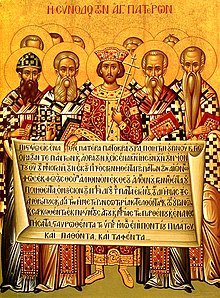Holy hell, NO. :facepalm: I never said anything like that. How is this so hard?
It wasn't for me. You made it sound like that. Now that we got that cleared up we can move on.
I did no such thing. You said nobody notable adopted Christianity before Constantine, only poor people. I proved otherwise. That's it. I didn't say people were more notable than Constantine, or on the same level, or anything similar to either of those things. Only that notable people did, in fact, convert to Christianity before Constantine did.
No I said poor people were the ones who adopted Christianity first and that the current Christian leaders weren't as influential as Constantine. Let me ask you something...Do you honestly believe that without Constantine's conversion that Christianity would have taken over Europe as it did?
Quote me where you said it, because I don't recall you ever saying anything like that.
Here's what I consider to be the truth of the matter. Christianity was taking over whether Constantine adopted it or not. If he didn't convert, we can't theorize what would have happened with him in office because he wouldn't have continued as Emperor for much longer at that rate. He hopped on board because as an Emperor you don't get outvoted - that's not how you stay in office. Rodney Stark, an expert in early centuries history, along with plenty of other historians, claim that by 350 A.D. at the latest, around 52% of the Roman Empire was believing and professing Christ as Lord.
"Among the poor it grew but not until anybody with any real power came along. " This is what I said. Early Christianity was fragmented into many groups and if it wasn't solidified by Constantine would have never taken hold as much as it did.
Taken from Wikipedia: The Emperor
Constantine I was exposed to Christianity by his mother,
Helena.
[41] At the
Battle of Milvian Bridge in 312, Constantine commanded his troops to adorn their shields with the Christian symbol in accordance with a vision that he had had the night before. After winning the battle, Constantine was able to claim the emperorship in the West
[42]
How much Christianity Constantine adopted at this point is difficult to discern. The Roman coins minted up to eight years subsequent to the battle still bore the images of Roman gods.
[41] Nonetheless, the accession of Constantine was a turning point for the Christian Church. After his victory, Constantine supported the Church financially, built various basilicas, granted privileges (e.g., exemption from certain taxes) to clergy, promoted Christians to some high-ranking offices, and returned property confiscated during the Great Persecution of Diocletian.
[43] Between 324 and 330, Constantine built, virtually from scratch, a new imperial capital that came to be named for him:
Constantinople. It had overtly Christian architecture, contained churches within the city walls, and had no pagan temples.
[44] In accordance with a prevailing custom, Constantine was baptised on his deathbed.


Icon depicting
the Emperor Constantine (centre) and the
bishops of the
First Council of Nicaea (325) holding the
Niceno–Constantinopolitan Creed of 381.
Constantine also played an active role in the leadership of the Church. In 316, he acted as a judge in a North African dispute concerning the
Donatist controversy. More significantly, in 325 he summoned the
Council of Nicaea, the first
Ecumenical Council, to deal mostly with the
Arian controversy, but which also issued the
Nicene Creed, which among other things professed a belief in "One Holy Catholic Apostolic Church." Constantine thus established a precedent for the emperor as responsible to
God for the spiritual health of their subjects, and thus with a duty to maintain orthodoxy. The emperor was to enforce doctrine, root out heresy, and uphold ecclesiastical unity.
[45]

